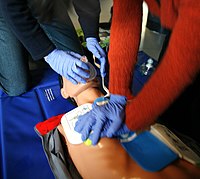
Photo from wikipedia
BACKGROUND Responder smartphone apps use global positioning data to enable emergency medical services to alert volunteer responders of nearby potential out-of-hospital cardiac arrests (OHCA). AIM To assess volunteer availability, interventions… Click to show full abstract
BACKGROUND Responder smartphone apps use global positioning data to enable emergency medical services to alert volunteer responders of nearby potential out-of-hospital cardiac arrests (OHCA). AIM To assess volunteer availability, interventions provided and frequency of probable post traumatic stress disorder (PTSD) experienced by responders receiving a smartphone alert. METHODS A web-based survey was emailed to alerted responders at week-two post-alert and a PTSD screening survey at week-six, in Victoria, Australia (1/08/2019-8/11/2020), and in New Zealand (18/02/2020-28/10/2020). RESULTS We received 1,985 responses to the week-two survey and 1,443 responses to the week-six survey. Of the 1,985 responders, 1,744 (87.9%) had completed cardiopulmonary resuscitation (CPR) training in the last twelve months, and 1,514 (76.3%) had performed CPR at least once. The alert was seen by 1,501 (75.6%) responders, 749 (37.7%) accepted the alert, 538 (27.1%) arrived on scene, and 283 (14.3%) provided care to the patient. In the multivariable analysis, CPR training within twelve months was associated with increased odds of responders accepting alerts (AOR 1.41, 95%CI: 1.02-1.96; p=0.040). Responders who had performed CPR before, were more than twice as likely to provide patient care compared to responders who had not (AOR 2.54, 95%CI: 1.56-4.12; p<0.001). One responder screened positive for probable PTSD. CONCLUSION Acceptance rates in Australia and New Zealand were consistent with other smartphone apps. Responder recruitment should be targeted at those with medical backgrounds who have prior CPR experience, as they are more likely to provide care. The very low risk of PTSD is reassuring information when recruiting volunteers.
Journal Title: Resuscitation
Year Published: 2021
Link to full text (if available)
Share on Social Media: Sign Up to like & get
recommendations!